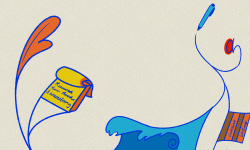Five beers into the night, I stood bewildered in the corner of the Plaza de Armas. With me were five Peruvian men, laughing boisterously and passing me a bottomless bottle of beer, while a mass of elaborately costumed dancers swirled around us. When the tourist train to Machu Picchu came in, the passengers anxiously descended and weaved through the tumult toward their hotels, lugging their unwieldy bags, only stopping every so often to look at the dancers.
For a moment, I stepped back inside of myself and tried to piece it together—why was I a part of the celebration when the rest of my kind wandered through it, somehow isolated the festival as if it were a museum exhibit? I had lived in Ecuador for two years as a child, and I had spent the last five months in Chile, but I had always distinctly felt separate, foreign. Why now, in a distinctly tourist town, was I being offered a momentary connection to this culture?
I looked up to see the local man who had taken my father and I on a hike earlier in the day and who would guide us through the ruins of Machu Picchu early the next morning. His name was Rubén, and he was a slight, middle-aged Quechua man of feline features. It was his friends and brothers I was now drinking with.
I doubted all of his clients received such treatment, and earlier in the day it would have been unforeseeable. Rubén had met us in the train station, dressed impeccably—chinos, a khaki vest and a hat embroidered with the name of his guide school—and hurried us over to the hotel, then rushed away to do other work. 30 minutes after dropping us off, he met up with us again to lead us up a steep, longtrail to a distant overlook of Machu Picchu.
Rubén never broke a sweat, but he kept his distance ahead of us, lagging behind only to give us a breather and occasional lectures on history, flora and fauna. His cell phone rang every 15 minutes, and he unabashedly negotiated with tour providers in front of us. It seemed to us that, for Rubén, my father and I were simply that day’s charges.
In an attempt to make a connection with Rubén and to slow down the march, I told him I spoke a little bit of his native tongue, Quechua, because I’d been taking classes in it in Santiago.
Suddenly, he was captivated, shocked and somehow flattered.
He began to pepper me with questions in the language, quickly laying bare my poor grasp of it. Quechua is not a unified tongue, but rather a family of indigenous languages, and what I had learned in Santiago was quite different from what I was being tested in atop Putukusi. Furthermore, I could read and write basic Quechua (one spelling of it, anyway) much better than I could speak it.
But Rubén was impressed nonetheless. He stopped answering his cell phone. He introduced me to every local we passed on the way down, and their eager attempts at conversation were a far cry from the redundant drills in my classes in Chile. He even began to introduce me as “The next ambassador to Cuzco”—a tall order for a 20-year-old, especially when the only embassy was in Lima.
After dinner that night, Rubén asked me, over the racket of brass bands and the yelps of dancers headed toward the plaza, if I wanted him to check out the festival and to have “una cerveza, nada más.” We dropped my tired dad off at the hotel, and I eventually went back to the plaza despite my reservations—it was late, and I had a bus to catch at four the next morning.
That one beer, of course, became many more, as each friend of Rubén’s that entered the circle offered me a beer (Rubén cautioned me against “refusing their generosity”). At first, these Peruvian men were put off by my presence.
I was a foreigner in their town, one of the few truly prospering places in the country, but which hardly reflected the realities of local life: the local workers lived out of the town’s sight, every restaurant hired musicians to endlessly loop “El Condor Pasa,” and the tons of trash produced by foreigners was quietly put on a train at night and carried four hours away to Cuzco.
But their barriers slowly came down. Whether it was the beer or the things Rubén said about me, I don’t know. They joked with me about the U.S., about my name, about women … one even laughingly offered to show me “the menu” of local girls. I certainly never became one of them, there were too many miles and too many assumptions between us for that. But for a few hours that night, I had been offered a glimpse into their lives, to be surrounded in their culture, if only because I had once tried to speak their language.



